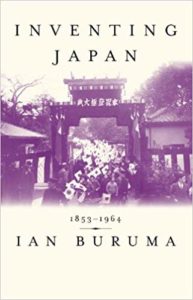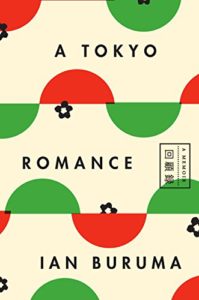
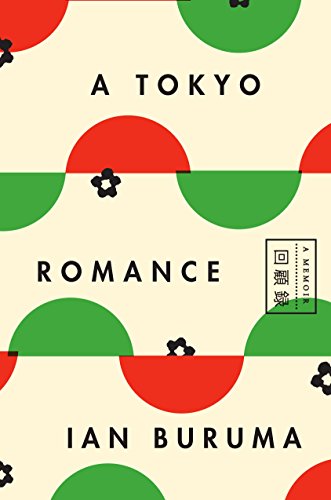
Support BOA by ordering A Tokyo Romance through these links:
Amazon U.S.
Barnes & Noble U.S.
Apple Books U.S.
Amazon Japan
Thanks for helping support Books on Asia!

Book Description:
When Ian Buruma arrived in Tokyo as a young film student in 1975, he found a feverish and surreal metropolis in the midst of an economic boom, where everything seemed new and history only remained in fragments. Through his adventures in the world of avant-garde theatre, his encounters with carnival acts, fashion photographers and moments on-set with Akira Kurosawa, Buruma came of age. For an outsider, unattached to the cultural burdens placed on the Japanese, this was a place to be truly free. A Tokyo Romance is a portrait of a young artist and the fantastical city that shaped him, and a timeless story about the desire to transgress boundaries: cultural, artistic and sexual.
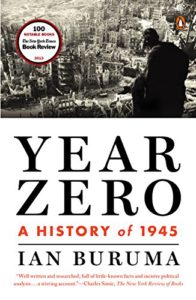
Books on Asia’s take:
Ian Buruma lived in Tokyo from 1975 to 1981. Part of this time he was a student at film school. In 2018, he published this memoir written mostly from memory since, as the author admits, in that pre-internet age he wrote very few letters and didn’t keep a diary of his experiences.
So this memoir is about the this now-accomplished writer looking back on his Tokyo days hanging out with prominent people such as Donald Richie, Akira Kurosawa and a few greats of the theater world such as Kara Juro and Maro Akaji. The book is full of excellent description, always entertaining, but one gets the feeling that life was passing Buruma by. Perhaps many foreigners living here can relate to this, however, since it usually takes a certain number of years (probably more than the six Buruma spent) to find your place in Japanese society and learn how to truly make it work for you.
Buruma was presented with opportunity after breathtaking opportunity, but never could make these juicy leads work for him: He never gets on the silver screen despite the invitations to appear in works by Kurosawa, he fails at Butoh Theater, and his first student film is, in his words, an embarrassment. He even fails miserably at a translation opportunity to render a Japanese story into English. He did, however, become very proficient in spoken Japanese. But Buruma is refreshingly authentic and doesn’t try to pass himself off as anything other than himself. He admits his inadequacies and while we, as frustrated readers, might wish he were more valiant, courageous, and magnanimous, ultimately he doesn’t disappoint.
There are some transfixing stories such as an account of Kara Juro brawling with author Nosaka Akiyuki at the Golden Gai. All is told with rich detail and a command of the English language that it is delightful to read, successfully masking a mundane account of a rather lazy Dutch student coming to terms with his sexual identity and his role as a full member of society. Buruma knows Japan and doesn’t fall into the trap of trying to explain Japan, and generally skips the cliches. Only at the end of the book, when he falls into deep introspection of the meaning of being a foreigner in Japan, does he slip ever so slightly into the trite pontificating on the meaning of the expat experience in Japan. In the end, when Japan has chewed him up and spit Buruma out, he finally decides to leave. Not everyone can thrive in this ego-boosting country.
This book will appeal to Japan expats, scholars of Tokyo in the 1970’s, fans of Butoh and the Japanese performing arts, Donald Richie and Buruma’s other works. If you’re looking for new information on Donald Richie, however, there’s nothing in here that hasn’t already appeared elsewhere.
Editorial Reviews of Tokyo Romance from Amazon:
“A triumphal narrative . . . a winning mix of nostalgic bravado and judicious self-deprecation.…luscious and precise . . . In a time when the country’s public image abroad consisted largely of manufacturing and geisha girls he located an avant-garde culture and entered it fully, unafraid of drunken excess then and unafraid of recalling it now. ” — Andrew Solomon, New York Times Book Review
“Buruma is a keen observer and the owner of a well-provisioned mind. There are smart little junkets in this book into everything from Japanese movies (Buruma became a film critic for The Japan Times) to the country’s tattooing culture to its female elevator operators, about whom he made a documentary film. His prose is unflaggingly good.” — New York Times
“[A]n unusually lucid writer. . . . Buruma paints a vivid portrait of his often mind-boggling encounters with the motley collection of artists, expats and eccentrics he befriended over his six years in Tokyo. And his honesty is disarming.” — AP
“Oh my eyes. . . . the whole thing sparks astonishingly to life. We’ll come back to the details, lurid or otherwise, but for now all you need to know is that Buruma’s high-level immersion in the country’s culture begins with him tottering around on takageta, a high-heeled version of the traditional Japanese wooden sandals, and ends with him playing a character called the Midnight Cowboy in a play by the underground director and actor Kara Juro. In between, there are visits to porn cinemas, a string of lovers of both sexes, an appearance in a Suntory whisky ad alongside the great Akira Kurosawa, and a non-star turn in a butoh show in which he appears on stage wearing only a scarlet jockstrap.” — The Guardian
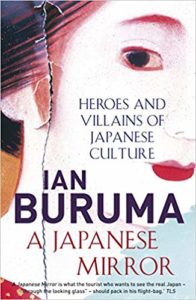 “Delicious… a wild ride through the late-20th-century Japanese avant-garde scene through the eyes of an innocent from across the sea.” — Kirkus, starred review
“Delicious… a wild ride through the late-20th-century Japanese avant-garde scene through the eyes of an innocent from across the sea.” — Kirkus, starred review
“New York Review of Books editor Buruma reflects on his immersion in the artistic underworlds of late 1970s Tokyo in this lucid, engrossing memoir…Buruma makes the archetypal quest for home in a foreign land both uniquely personal and deeply illuminating.” — Publisher’s Weekly, starred review
“With the insight and curiosity of someone on the outside looking in, Buruma describes a transformational moment in the making of modern Japanese culture.” — Booklist


